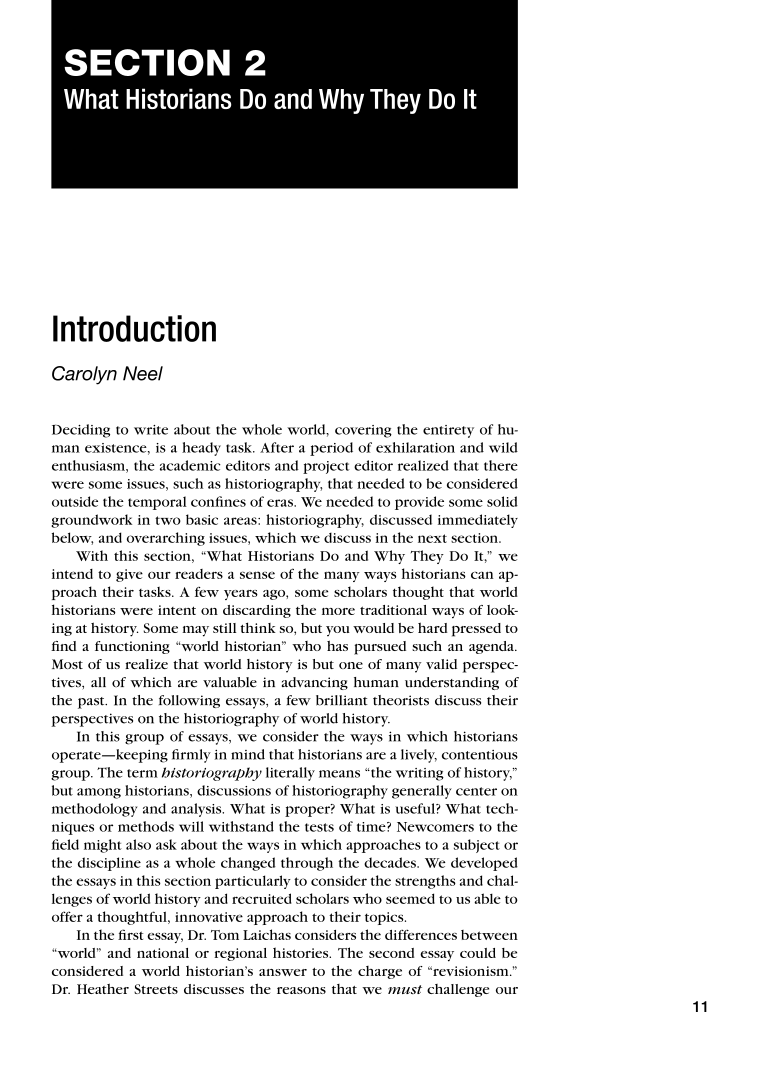11 Introduction Carolyn Neel Deciding to write about the whole world, covering the entirety of hu- man existence, is a heady task. After a period of exhilaration and wild enthusiasm, the academic editors and project editor realized that there were some issues, such as historiography, that needed to be considered outside the temporal confines of eras. We needed to provide some solid groundwork in two basic areas: historiography, discussed immediately below, and overarching issues, which we discuss in the next section. With this section, “What Historians Do and Why They Do It,” we intend to give our readers a sense of the many ways historians can ap- proach their tasks. A few years ago, some scholars thought that world historians were intent on discarding the more traditional ways of look- ing at history. Some may still think so, but you would be hard pressed to find a functioning “world historian” who has pursued such an agenda. Most of us realize that world history is but one of many valid perspec- tives, all of which are valuable in advancing human understanding of the past. In the following essays, a few brilliant theorists discuss their perspectives on the historiography of world history. In this group of essays, we consider the ways in which historians operate—keeping firmly in mind that historians are a lively, contentious group. The term historiography literally means “the writing of history,” but among historians, discussions of historiography generally center on methodology and analysis. What is proper? What is useful? What tech- niques or methods will withstand the tests of time? Newcomers to the field might also ask about the ways in which approaches to a subject or the discipline as a whole changed through the decades. We developed the essays in this section particularly to consider the strengths and chal- lenges of world history and recruited scholars who seemed to us able to offer a thoughtful, innovative approach to their topics. In the first essay, Dr. Tom Laichas considers the differences between “world” and national or regional histories. The second essay could be considered a world historian’s answer to the charge of “revisionism.” Dr. Heather Streets discusses the reasons that we must challenge our Section 2 What Historians Do and Why They Do It
Document Details My Account Print multiple pages
Print
You have printed 0 times in the last 24 hours.
Your print count will reset on at .
You may print 0 more time(s) before then.
You may print a maximum of 0 pages at a time.

























































































































































































































































































































































































































































































































































































































































































































































































































































































































































































































































































































































































































































































































































































































































































































































































































































































































































































































































































































































































































































































































































































































































































































































































































































































































































































































































































































































































































































































































































































































































































































































































































































































































































































































































































































































































































































































































































































































































































































































































































































































































































































































































































































































































































































































































































































































































































































































































































































































































































































































































































































































































































































































































































































































































































































































































































































































































































































































































































































































































































































































































































































































































































































































































































































































































































































































































































































































































































































































































































































































































































































































































































































































































































































































































































































































































































































































































































































































































































































































































































































































































































































































































































































































